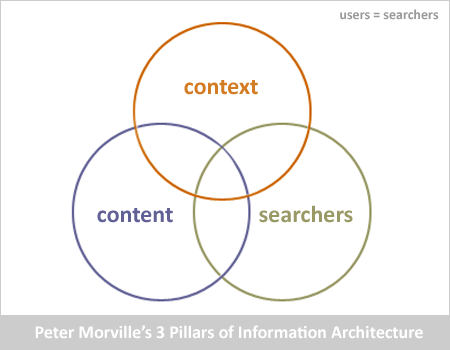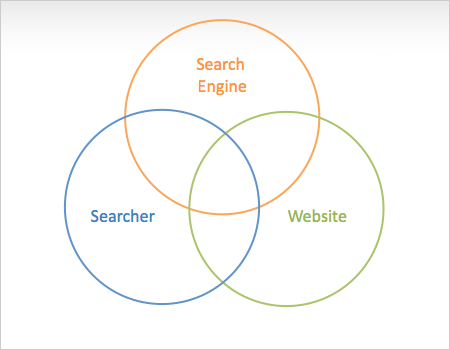A Simple Guide To Understanding The Searcher Experience
When search engine optimization (SEO) professionals talk about the searcher experience, they often cast their personal mental models onto the minds of searchers. What is your role in understanding and delivering a successful searcher experience?
When search engine optimization (SEO) professionals talk about the searcher experience, they often cast their personal mental models onto the minds of searchers. Believe it or not, I understand why this happens. I think humans do this naturally, without thinking. We assume that others have the same, or similar, contexts that we have.
That thought reminded me of information architecture guru Peter Morville’s 3 Circles/Pillars of Information Architecture (diagram below):
In this diagram, Morville shows how and why we must strike a balance on each web project between “business goals and context, user needs and behavior, and the available mix of content.”
I wondered if there might be an analogous diagram for SEO, and I came up with this:
In order to achieve a successful searcher experience, all 3 of these elements need to be present and align beautifully. Let’s look at each of these items individually and see how each group is responsible for their part of the searcher experience.
Website Owners & Aboutness
Website owners have a very important contribution to the searcher experience: aboutness. Aboutness needs to be communicated to both searchers and search engines:
- Do content labels (titles, headings, subheadings, annotations/descriptions, etc.) communicate what page content is about?
- Do navigation labels reinforce a sense of place, information scent, and the aboutness of page content?
- Do document labels (file name, URL structure, etc.) communicate aboutness well enough when search engines are not yet able to clearly determine aboutness from actual document content, such as a graphic image (GIF, JPEG, PNG)?
Aboutness is a term that few people know about or comprehend. Because of this “aboutness” ignorance, it is often skipped and/or misinterpreted during the web development, content creation, and search optimization processes.
Regardless of knowledge level, website owners and SEOs alike both contribute heavily to the searcher experience. Our responsibility is to communicate aboutness to both search engines and searchers as succinctly and clearly as we can.
That being said, now let’s look at another circle of the searcher experience….
Web Searchers & Keywords
Web searchers have a responsibility to communicate what they want to find. As a website usability professional, I have the opportunity to observe Web searchers in their natural environments. What I find quite interesting is the “Blame Google” mentality.
I remember a question posed to me during World IA Day this past year. An attendee said that Google constantly gets search results wrong. He used a celebrity’s name as an example.
“I wanted to go to this person’s official website,” he said, “but I never got it in the first page of search results. According to you, it was an informational query. I wanted information about this celebrity.”
I paused. “Well,” I said, “why are you blaming Google when it is clear that you did not communicate what you really wanted?”
“What do you mean?” he said, surprised.
“You just said that you wanted information about this celebrity,” I explained. “You can get that information from a variety of websites. But you also said that you wanted to go to X’s official website. Your intent was clearly navigational. Why didn’t you type in [celebrity name] official website? Then you might have seen your desired website at the top of search results.”
The stunned silence at my response was almost deafening. I broke that silence.
“Don’t blame Google or Yahoo or Bing for your insufficient query formulation,” I said to the audience. “Look in the mirror. Maybe the reason for the poor searcher experience is the person in the mirror…not the search engine.”
People need to learn how to search. Search experts need to teach people how to search. Enough said.
Connecting Searchers & Web Documents
Search engines certainly have a responsibility in the searcher experience. Not only must search engines correctly and accurately interpret searcher intent from often-insufficient keyword combinations, they must also accurately determine the aboutness of millions (or billions) of Web documents. And then rank those documents accordingly.
Search engine software engineers have a very difficult responsibility, as website owners and other Web professionals do not label content and navigation clearly, and searchers honestly do not know how to search effectively. Add to that the many, many unethical SEO practices that are misleading and that miscommunicate aboutness? Well, let’s just say that I have a great deal of empathy for search engine software engineers.
What are your responsibilities and contributions to a successful searcher experience…both as an SEO/SEM professional and as a web searcher? Can you objectively see your “Blame Google” mentality? Can you objectively and consistently communicate aboutness to both humans and machines? Do search engines misinterpret searcher behaviors and aboutness?
Think about it. The answers might not be as simple as we would like them to be.
Opinions expressed in this article are those of the guest author and not necessarily Search Engine Land. Staff authors are listed here.
Related stories
New on Search Engine Land

